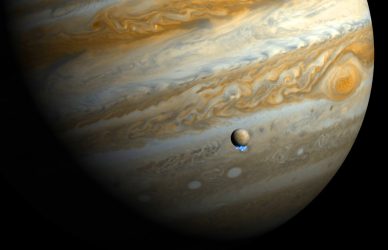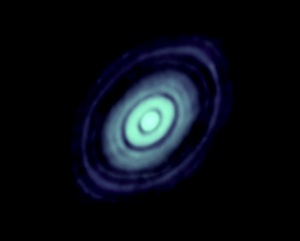I had a dream the other night about siphoning hydrogen off the surface of Jupiter and piping it across our solar system. Why? To power a space colony of course, or better yet, a new kind of space craft capable of many-orders-of-magnitude faster travel than current vehicles. Of course, these would need vast quantities of energy. Hydrogen would seem to be the logical solution. Hydrogen powers stars, after all. But in space, being large is not really a problem, there is after all, space.
In the background of such ideas were some other thoughts, given our very preliminary information about our “local” place in our galaxy, the Milky Way, and our vague (but rapidly growing) understanding of how much of the physics works of star formation and “baby” proto planetary disks, it seems plausible that we are perhaps “meant” to know or to discover regions beyond our solar system. These are hints in the cosmic “wind” perhaps from distant places we must someday explore, yet these are not on the forefront of consciousness. But, the recent findings about planetary atmospheres, comet geology, lunar oceans, and proto-earths continue to pour in. Do we have the technology, to go at fast enough speeds to explore our local galaxy? I believe we can, it is physically possible. And the latest results of what are essentially “ion drives” maybe only at the “steam engine” level now, but only improving, show that we can in theory go 10X faster than what vehicles do currently.
[Protoplanetary disk in Taurus (Hubble/NASA)]
But I would add something else here. We are also making breakthroughs in robotics and AI as well as genetics. It may be feasible or it might even become prudent for us as a species to explore our galaxy in terms of using these advancements that can extend what is possible for exploration. Robots don’t age. But neither do genomes.
And I believe the first real milestone would need to be a colony, not necessarily on a local planet, but in an artificial structure, a satellite. It seems this is the only way to induce artificial gravity, what is currently necessary to offset those
Will we have the ability to move forward? When the time comes? This would seem to require a ‘critical mass’ of knowledge. At a cultural level. And in that respect, the test of our technology to advance beyond what is even imaginable now, may be a higher priority than simply one of aesthetics or a popular “preference.” Much like we observe the past, already written in the stars, the future will be our judge, and it is definable by our actions. Did we delay our “race” forward, precious time ticking away by needless concern about the local trivialities, the battles that did not matter? (When we should have moved much faster to overcome our biological and technological limits?) It is difficult to imagine that we could still be a culture of war, for too much longer, wasting precious years in self destruction. An industrial shift would be required, to make propulsion, exo-energy sources (hydrogen mining), artificial gravity, AI, and biotechnology for the next great exodus. The galaxy calls like the distant shores of an unexplored continent…
[NOTE: This article first appeared on blogger 5.21.15]


You must be logged in to post a comment.